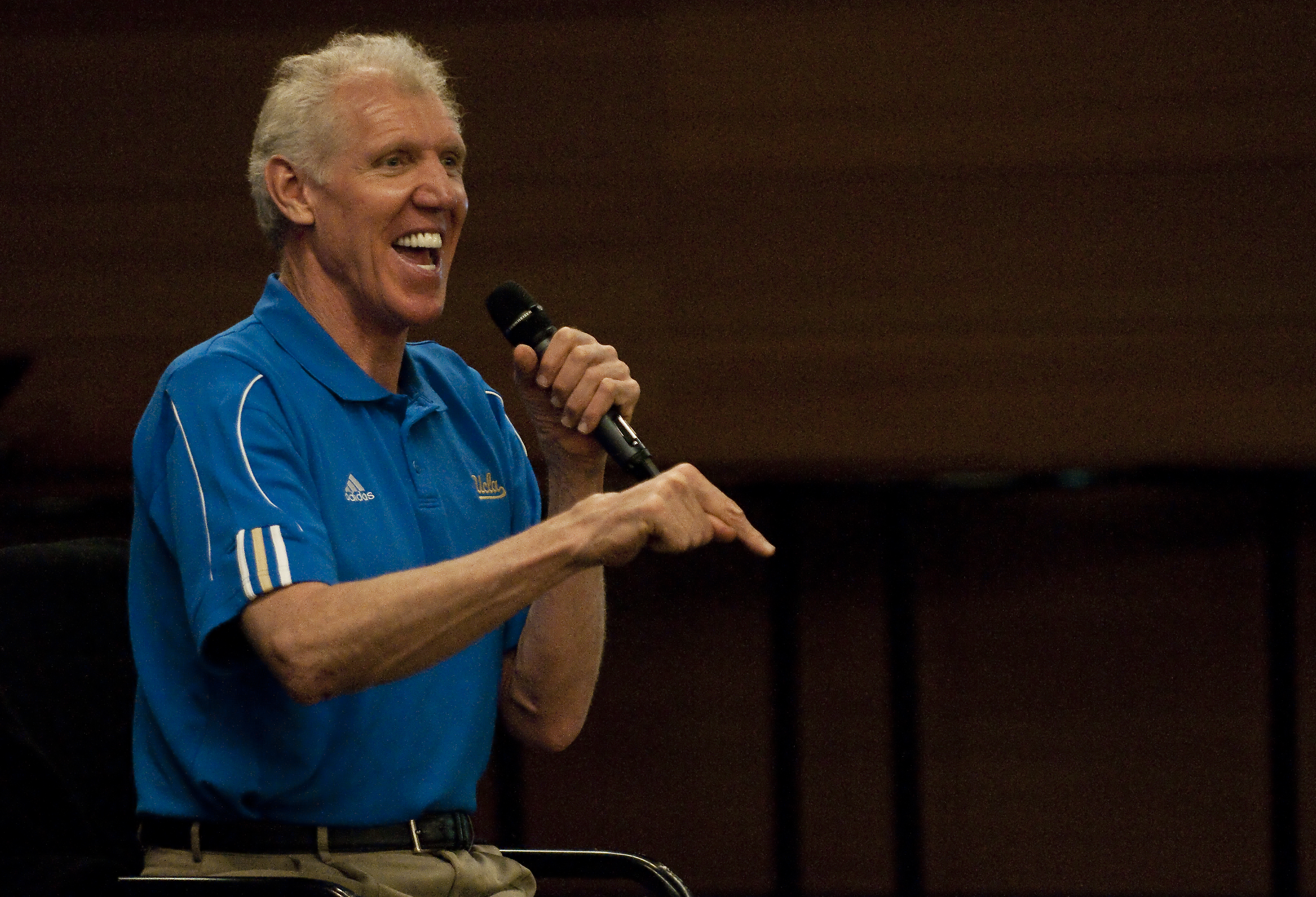UCLA basketball legend Bill Walton opens up on pain, perseverance

On Thursday, UCLA basketball legend Bill Walton spoke to students in the Pauley Pavilion Club during the UCLA stop of his Pac-12 campus speaking tour. The Hall of Famer recounted his chronic struggles with injury and the surgery that saved his life.
By Emilio Ronquillo
Jan. 18, 2013 1:36 a.m.
Seconds were ticking away behind Bill Walton in the Pauley Pavilion Club, and the UCLA great spoke to his audience with a fervor suggesting a running game clock. Walton hammered out anecdotes left and right, using his hands to mimic blocked shoots and back-door passes as he reflected on his UCLA career and spoke about the challenges and principles of pursuing dreams.
“Offense wins championships,” Walton said at one point during the UCLA stop of his Pac-12 campus speaking tour, instructing the crowd to approach ambitions by “attacking,” as opposed to settling for the baseline of working hard. No one in the crowd could accuse the animated Walton of failing to live by his own philosophy: The former center extended his stories and opinions numerous times, often drowning out the event facilitator’s attempts to move forward with the scheduled topics of discussion.
Despite being part of “one of the most unathletic families around,” which was headed by parents infinitely more interested in music and the arts, the 60-year-old Walton certainly came from an environment supportive of his quest to become a basketball player.
“I was 21 before I ever encountered anyone who didn’t have my best interests in heart … I grew up in a perfect world.
Fantastic parents, incredible schools, California, the ’50s and ’60s, John Wooden. It was perfect,” said the three-time Naismith Player of the Year.
While reflecting on his idyllic youth, Walton recalled notable problems in his social life, including a speech impediment and arguments with his former UCLA coach, Wooden, over acceptable hair length and the permissibility of cheerleaders in his hotel room.
“I spent my whole life trying to chase down opportunities that were like UCLA, better than perfect,” he said.
Roughly halfway into the event, the scoreboard froze, and for the rest of Walton’s talk there were 11 minutes left in a nonexistent half. Walton’s pace failed to slacken one bit as he dove into the darkest days of his life, when physical foundation could not support a larger-than-life player.
He informed his audience of a lengthy injury list that took 36 orthopedic operations to clear.
Torn knee at the age of 13; a structural congenital problem that led to foot stress fractures throughout his career; ankle fusion surgery; wrists that no longer work as they once used to.
Struggles with major injuries conspired to limit the two-time NBA champion’s 14-year professional career: He missed four seasons entirely and in only three seasons did he play over 60 of 82 regular-season games.
“I crawled (out of the game). There was no choice. I haven’t been able to play in 27 years,” Walton said.
But the anguish of leaving the sport he loved could not match the despair Walton felt as a result of two broken spines suffered his senior year that not only ended UCLA’s record 88-game winning streak, but also nearly ended Walton’s life.
Walton’s spine collapsed six years ago, after three decades of back pain. “I spent … three years on the ground, in unrelenting, debilitating, excruciating pain … and I could never get out. Ever. My life was over. … If I had a gun, I would have used it. … First you think you’re going to die, and then you want to die. And then you come to the realization, the worst of all: that I’m going to live. And this is what I’m stuck with, forever.”
Good fortune and technology were able to pull Walton out of the abyss. “I was lucky that my life was saved by a brilliant surgeon, in conjunction with a revolutionary medical device and technology company which has completely changed spine surgery,” Walton said, who reported that he is currently pain-free.
The Basketball Hall of Famer’s story touched members of the audience, inspiring a few students to make the best of their own struggles.
“He overcame so much … (and has) been through a lot. That really inspires me to know that people can … have it all taken it away, but still thrive to be at the happiest point in (their) life right now,” said third-year electrical engineering student Garrett Kawabata.
“He thrived, he succeeded, and if he can overcome that, then I can also … succeed and get back on track,” said third-year psychology student Justin Matute.
Although a broken body cost him the chance to have a longer NBA career, Walton found his second calling by turning an old inability into a strength. Walton overcame his speech impediment at the age of 28, eventually becoming a commentator for the NBA. Currently a commentator for the Pac-12, the one-time NBA MVP and Sixth Man of the Year also passes his time by encouraging developments in the business world.
“I love the entrepreneurial spirit. The work we do with all the start-up companies and helping people chase their dreams, there’s nothing like that,” Walton said.
Walton eloquently closed by referring to the likes of his beloved Grateful Dead, Bob Dylan and Neil Young, dropping quotes from the musicians in a succession that nearly came off as poetry.
“Walk like a giant … don’t float like rivers in the stream,” he said, referencing Young.
The clock on Walton’s basketball career stopped nearly three decades ago. And yet, his ability to rebound and create for others in life’s game was never more apparent than on Thursday.


